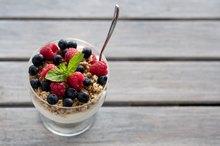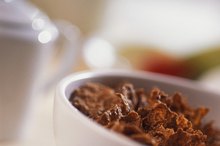What does fact checked mean?
At Healthfully, we strive to deliver objective content that is accurate and up-to-date. Our team periodically reviews articles in order to ensure content quality. The sources cited below consist of evidence from peer-reviewed journals, prominent medical organizations, academic associations, and government data.
The information contained on this site is for informational purposes only, and should not be used as a substitute for the advice of a professional health care provider. Please check with the appropriate physician regarding health questions and concerns. Although we strive to deliver accurate and up-to-date information, no guarantee to that effect is made.
Nutritional Information for Date Coconut Roll
If you're looking for something to satisfy your sweet tooth, but trying to stay away from your usual candy bar and cookies, you might want to consider a date coconut roll. This dried fruit sweet treat combines the very sweet date with coconut and nuts to create a bite-size treat. The coconut date nut roll is low in calories and a good source of fiber 12.
Calories
A 2-ounce date coconut roll contains 110 calories. When compared with other sweet snacks, such as a candy bar, which typically contains up to 300 calories per 2-ounce serving, the date coconut roll is a calorie bargain. Substituting the low-calorie treat for your usual candy bar can help you save a significant number of calories and aid in weight control.
Carbohdyrates and Fiber
Nutritional Value in Li Hing Mui
Learn More
The carbohydrates in the date coconut roll provide most of the calories 2. A 2-ounce portion contains 21 grams of carbs, 2 grams of fiber and 18 grams of sugar. While most of the carbs are in the form of sugar, it is not added sugar, but the natural sugar found in the dates. In addition to being low in calories, the date coconut roll is also a good source of fiber, which alleviates constipation, controls hunger and helps lower blood cholesterol levels.
- The carbohydrates in the date coconut roll provide most of the calories 2.
Fat and Protein
The date coconut roll contains some fat, but it is not a good source of protein. A 2-ounce serving contains 3 grams of total fat, 2 grams of saturated fat and 1 gram of protein. Unfortunately, because it contains coconut, the sweet treat is a source of the cholesterol-raising saturated fat. To help keep your cholesterol under control, try to limit your daily intake of saturated fat to less than 10 percent of your calorie intake, or no more than 20 grams on a 2,000-calorie diet.
- The date coconut roll contains some fat, but it is not a good source of protein.
- Unfortunately, because it contains coconut, the sweet treat is a source of the cholesterol-raising saturated fat.
Sodium
Cinemark Movie Theater Popcorn Nutritional Facts
Learn More
The date coconut roll does not contain any salt and is very low in sodium. A 2-ounce portion contains just 10 milligrams of sodium. Choosing more low-sodium foods can help reduce your overall intake, and might help reduce your risk of developing high blood pressure, or hypertension. You should keep your daily intake of sodium to less than 2,300 milligrams a day. If you already have hypertension, you should limit your daily sodium to 1,500 milligrams a day.
- The date coconut roll does not contain any salt and is very low in sodium.
- If you already have hypertension, you should limit your daily sodium to 1,500 milligrams a day.
Iron
Although not significantly high in iron, the date coconut roll can help you meet your needs. A 2-ounce roll meets 2 percent of your daily value for iron. The percent daily value, developed by the Food and Drug Administration, is based on a 2,000-calorie diet for healthy adults. Iron is an essential mineral needed to help hemoglobin carry oxygen throughout your body.
- Although not significantly high in iron, the date coconut roll can help you meet your needs.
- The percent daily value, developed by the Food and Drug Administration, is based on a 2,000-calorie diet for healthy adults.
Related Articles
References
- Vegweb.com: Coconut/Nut/Date Rolls
- My Fitness Pal: Calories in Earthgrown Organic Coconut Rolled Dates
- Office of Dietary Supplements; "Iron"; August 2007
- Sankararaman S, Sferra TJ. Are We Going Nuts on Coconut Oil?. Curr Nutr Rep. 2018;7(3):107-115. doi:10.1007/s13668-018-0230-5
- Walters, D. R., Walker, R. L., & Walker, K. C. Lauric Acid Exhibits Antifungal Activity Against Plant Pathogenic Fungi. Journal of Phytopathology, (2003) 151(4), 228–230. doi:10.1046/j.1439-0434.2003.00713.x
- Mandal MD, Mandal S. Coconut (Cocos nucifera L.: Arecaceae): In health promotion and disease prevention. Asian Pacific Journal of Tropical Medicine. 2011;4(3):241-247. doi:10.1016/S1995-7645(11)60078-3
- USDepartment of Agriculture, Agricultural Research Services. FoodDataCentral. Oil, coconut (SR Legacy. FDC ID: 171412). FDC Published:4/1/2019. Washington, DC: USDepartment of Agriculture, Agricultural Research Services 2020 https://fdc.nal.usda.gov/fdc-app.html#/food-details/171412/nutrients
- Ko DT, Alter DA, Guo H, et al. High-Density Lipoprotein Cholesterol and Cause-Specific Mortality in Individuals Without Previous Cardiovascular Conditions: The CANHEART Study. J Am Coll Cardiol. 2016;68(19):2073-2083. doi: 10.1016/j.jacc.2016.08.038
- Eyres L, Eyres MF, Chisholm A, Brown RC. Coconut oil consumption and cardiovascular risk factors in humans. Nutr Rev. 2016;74(4):267–280. doi:10.1093/nutrit/nuw002
- Vijayakumar M, Vasudevan DM, Sundaram KR, et al. A randomized study of coconut oil versus sunflower oil on cardiovascular risk factors in patients with stable coronary heart disease. Indian Heart J. 2016;68(4):498–506. doi:10.1016/j.ihj.2015.10.384
- Lockyer S. Stanner S. Coconut oil – a nutty idea? Nutrition Bulletin. 2016;41(1):42-54. doi:10.1111/nbu.12188
- American Heart Association. Saturated Fat. Dallas, Tex.: American Heart Association 2020 https://www.heart.org/en/healthy-living/healthy-eating/eat-smart/fats/saturated-fats
- Boateng L, Ansong R, Owusu WB, Steiner-Asiedu M. Coconut oil and palm oil's role in nutrition, health and national development: A review. Ghana Med J. 2016;50(3):189-196.
- Eyres L, Eyres MF, Chisholm A, Brown RC. Coconut oil consumption and cardiovascular risk factors in humans. Nutr Rev. 2016;74(4):267-280. doi:10.1093/nutrit/nuw002
- Anagnostou K. Coconut Allergy Revisited. Children (Basel). 2017;4(10):85. doi:10.3390/children4100085
- Babu AS, Veluswamy SK, Arena R, Guazzi M, Lavie CJ. Virgin coconut oil and its potential cardioprotective effects. Postgrad Med. 2014;126(7):76-83. doi: 10.3810/pgm.2014.11.2835
- De la rubia ortí JE, García-pardo MP, Drehmer E, et al. Improvement of Main Cognitive Functions in Patients with Alzheimer's Disease after Treatment with Coconut Oil Enriched Mediterranean Diet: A Pilot Study. J Alzheimers Dis. 2018;65(2):577-587. doi:10.3233/JAD-180184
Writer Bio
Jill Corleone is a registered dietitian and health coach who has been writing and lecturing on diet and health for more than 15 years. Her work has been featured on the Huffington Post, Diabetes Self-Management and in the book "Noninvasive Mechanical Ventilation," edited by John R. Bach, M.D. Corleone holds a Bachelor of Science in nutrition.









